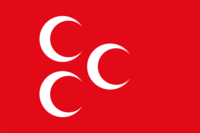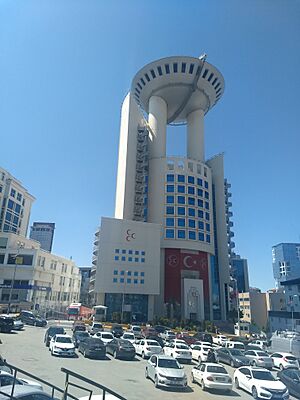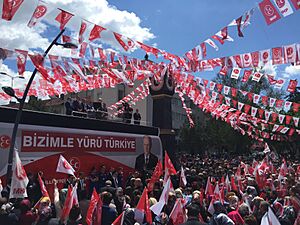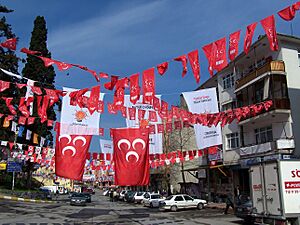Nationalist Movement Party facts for kids
Quick facts for kids
Nationalist Movement Party
Milliyetçi Hareket Partisi
|
|
|---|---|
 |
|
| Abbreviation | MHP |
| President | Devlet Bahçeli |
| General Secretary | İsmet Büyükataman |
| Founder | Alparslan Türkeş |
| Founded | 9 February 1969 24 January 1993 (re-establishment) |
| Preceded by | Republican Villagers Nation Party |
| Headquarters | Ehlibeyt Mh. Ceyhun Atuf Kansu Cd No:128, 06105 Ankara, Turkey |
| Youth wing | Grey Wolves |
| Membership (2024) | |
| Ideology |
|
| Political position | Far-right |
| National affiliation | People's Alliance |
| Colours | Red, Gray (official) Ruby red (customary) |
| Slogan | Ülkenin Geleceğine Oy Ver ("Vote for the Country's Future") |
| Grand National Assembly |
50 / 600
|
| Provinces |
8 / 51
|
| District municipalities |
114 / 922
|
| Belde Municipalities |
97 / 388
|
| Party flag | |
 |
|
The Nationalist Movement Party (MHP) is a political party in Turkey. Its name in Turkish is Milliyetçi Hareket Partisi. It is known for its strong nationalist views and is often described as a far-right party. The current leader of the MHP is Devlet Bahçeli.
The party was started in 1969 by Alparslan Türkeş, who was a former colonel in the Turkish Army. Before forming the MHP, he led another party called the Republican Villagers Nation Party. The MHP's main goals were based on Pan-Turkism and Turkish nationalism throughout the late 1900s. After Türkeş passed away in 1997, Devlet Bahçeli became the new leader. The party has a youth group called the Grey Wolves, which was involved in political events in Turkey during the 1970s.
Alparslan Türkeş founded the MHP because he felt that the Republican People's Party (CHP) had moved away from the nationalist ideas of their founder, Mustafa Kemal Atatürk. The MHP gained enough seats in the 1973 and 1977 general elections to be part of the government coalitions in the 1970s. The party was temporarily banned after a military takeover in 1980 but was re-established with its original name in 1993.
In the 1999 general election, the MHP had its best result ever, winning 18% of the votes and 129 seats in the parliament. Devlet Bahçeli then became Deputy Prime Minister as part of a government with other parties. However, his call for an early election led to the government ending in 2002. In the 2002 election, the MHP did not get enough votes (they fell below the 10% needed to enter parliament) and lost all their seats.
After the 2007 general election, the MHP won back its seats in parliament. For a while, the party was critical of the ruling Justice and Development Party (AKP) and its policies. However, since 2015, Bahçeli and the MHP have openly supported Recep Tayyip Erdoğan and the AKP. This led to some members leaving the MHP, including Meral Akşener, who then started a new party called the İYİ Party. The MHP supported a 'Yes' vote in the 2017 public vote on changing the constitution. They also formed an alliance with the AKP called the People's Alliance for the 2018 general election. The MHP currently supports the government led by the AKP.
Contents
History of the Nationalist Movement Party

Early Years (Before 1980)
In 1965, Alparslan Türkeş, a nationalist politician and former military officer, took control of the Republican Villagers Nation Party. In 1969, during a special meeting in Adana, Türkeş changed the party's name to the Nationalist Movement Party (MHP). They also chose a new party symbol with three crescent moons.
The MHP strongly supported Turkish nationalism. Groups linked to the party were involved in political violence during the 1970s. The youth wing of the party, known as the Grey Wolves, was very active during this time.
The MHP also had connections with a group called Aydınlar Ocağı (Hearth of Intellectuals). This group was started in 1970 by university professors. It helped connect different right-wing groups, including those who were secular, nationalist, and Islamic. They promoted an idea called "Turkish-Islamic synthesis," which influenced the MHP's ideas.
The MHP won enough seats in the 1973 and 1977 general elections to join the government. They were part of the "Nationalist Front" governments in the 1970s. On May 27, 1980, Gün Sazak, a deputy leader of the party, was killed by a left-wing group.
Re-establishing the Party
After a military takeover in 1980, the MHP was closed down. It was later reformed in 1983 under a new name, the "Conservative Party." In 1985, its name changed again to the "Nationalist Task Party." Finally, in 1992, it went back to its original name, the Nationalist Movement Party. In 1993, some members, including Muhsin Yazıcıoğlu, left to form a new party called the Great Union Party.
Devlet Bahçeli's Leadership
After Türkeş passed away, Devlet Bahçeli was chosen as the new leader in 1997. In the 1999 election, the MHP had its best performance, winning 18% of the votes and 129 seats. Bahçeli then became Deputy Prime Minister in a government with other parties. However, he called for an early election, which caused the government to fall apart in 2002. In the 2002 election, the MHP did not get enough votes to enter parliament.
In the 2007 general election, the MHP returned to parliament, winning 14.27% of the votes. The party was against peace talks between the government and the Kurdistan Workers Party. They also criticized the ruling AKP party for a while. However, since 2015, Bahçeli has openly supported Recep Tayyip Erdoğan and the AKP. This led to some disagreements within the party, and Meral Akşener left to form the İYİ Party. The MHP supported changes to the constitution in 2017 and formed an alliance with the AKP for the 2018 election. The MHP currently has 48 members of parliament and supports the AKP-led government.
What the MHP Believes In
The MHP follows an idea called the Nine Lights Doctrine, which combines Turkish nationalism with Islamic values. The party is often described as having very strong nationalist views and has been linked to some extreme groups. Since the 1990s, under Devlet Bahçeli's leadership, the MHP has tried to become more moderate. They now focus more on cultural nationalism and conservatism, emphasizing the unity of the Turkish state. They have also become more supportive of Islamic views and have accepted the rules of parliamentary democracy. Some people wonder if these changes are truly sincere. However, the MHP's more moderate approach has helped it gain more support from voters. It has become the third-strongest party in Turkey and has been in the National Assembly since 2007. The party's beliefs are also sometimes called Turkish-Islamic synthesis.
Views on the HDP
The MHP strongly disagrees with the left-wing, pro-Kurdish Peoples' Democratic Party (HDP). Devlet Bahçeli has often voted against the HDP in parliament. For example, in the 2015 parliamentary speaker elections, the MHP refused to support any candidate after the HDP announced support for another party's candidate. The MHP also said they would not join any government that had support from the HDP after the June 2015 election. A deputy leader of the MHP even said that "even using our party's name in the same sentence as the HDP will be counted as cruelty by us."
In 2021, Bahçeli called for the HDP to be closed down in several speeches.
Economic Plans
During the June 2015 general election, the MHP shared its economic plans. The party promised to help working people in Turkey by removing taxes on fuel and fertilizer. They also planned to raise the minimum wage to $518 and give a $37 transportation payment to minimum wage workers. For those who could not afford a house, they offered an extra $92 per month for rent. The MHP said these plans would help minimum wage earners in big cities earn an extra $646 each year.
The MHP stated that their economic policies would create 700,000 jobs. They also aimed to increase the national income per person to $13,300 and boost exports to $238 billion, while keeping economic growth at 5.2% between 2016 and 2019. However, these goals were not fully met, as the average income per person in Turkey decreased between 2014 and 2019.
Party Leaders
| # | Leader (birth–death) |
Portrait | Constituency | Took office | Left office |
|---|---|---|---|---|---|
| 1 | Alparslan Türkeş (1917–1997) |
Ankara (1965) Adana (1969, 1973, 1977) Yozgat (1991) |
8 February 1969 | 4 April 1997 | |
| – | Muhittin Çolak (acting) | 5 April 1997 | 6 July 1997 | ||
| 2 | Devlet Bahçeli (1948–) |
Osmaniye (1999, 2007, 2011, Jun/Nov 2015, 2018) |
6 July 1997 | Incumbent |
Election Results
General Elections

| Election date | Party leader | Number of votes received | Percentage of votes | Number of deputies | Position |
|---|---|---|---|---|---|
| 1969 | Alparslan Türkeş | 274,225 | 3.02% |
3 / 450
|
Opposition |
| 1973 | 362,208 | 3.38% |
3 / 450
|
Opposition | |
| 1977 | 951,544 | 6.42% |
16 / 450
|
Coalition government | |
| 1983 | Party closed following the 1980 Turkish coup d'état and succeeded by the Nationalist Task Party (1985–93). MHP was re-established in 1993. | ||||
| 1987 | |||||
| 1991 | |||||
| 1995 | Alparslan Türkeş | 2,301,343 | 8.18% |
0 / 550
|
Extra-parliamentary opposition |
| 1999 | Devlet Bahçeli | 5,606,634 | 17.98% |
129 / 550
|
Coalition government |
| 2002 | 2,629,808 | 8.35% |
0 / 550
|
Extra-parliamentary opposition | |
| 2007 | 5,001,869 | 14.27% |
71 / 550
|
Opposition | |
| 2011 | 5,585,513 | 13.01% |
53 / 550
|
Opposition | |
| June 2015 | 7,516,480 | 16.29% |
80 / 550
|
Opposition | |
| November 2015 | 5,599,600 | 11.90% |
40 / 550
|
Opposition | |
| 2018 | 5,565,331 | 11.10% |
49 / 600
|
Providing confidence and supply | |
| 2023 | 5,413,560 | 10.14% |
50 / 600
|
Providing confidence and supply | |
Senate Elections
| Election date | Party leader | Number of votes received | Percentage of votes | Number of senators |
|---|---|---|---|---|
| 1973 | Alparslan Türkeş | 114,662 | 2.7% |
0 / 52
|
| 1975 | 170,357 | 3.2% |
0 / 54
|
|
| 1977 | 326,967 | 6.8% |
0 / 50
|
|
| 1979 | 312,241 | 6.1% |
1 / 50
|
Local Elections
| Election date | Party leader | Provincial council votes | Percentage of votes | Number of municipalities | Map |
|---|---|---|---|---|---|
| 1973 | Alparslan Türkeş | 133,089 | 1.33% |
5 / 1,640
|
|
| 1977 | 819,136 | 6.62% |
55 / 1,730
|
||
| 1984 | Party closed following the 1980 Turkish coup d'état and succeeded by the Nationalist Task Party (1985–93). MHP was re-established in 1993. | ||||
| 1989 | |||||
| 1994 | Alparslan Türkeş | 2,239,117 | 7.95% |
118 / 2,710
|
|
| 1999 | Devlet Bahçeli | 5,401,597 | 17.17% |
499 / 3,215
|
|
| 2004 | 3,372,249 | 10.45% |
247 / 3,193
|
||
| 2009 | 6,386,279 | 15.97% |
483 / 2,903
|
||
| 2014 | 7,399,119 | 17.82% |
166 / 1,351
|
 |
|
| 2019 | 3,209,416 | 7.46% |
233 / 1,355
|
 |
|
| 2024 | 2,297,662 | 4.99% |
130 / 1,363
|
 |
|
See also
 In Spanish: Partido de Acción Nacionalista para niños
In Spanish: Partido de Acción Nacionalista para niños
- Nine Lights Doctrine
 | Sharif Bey |
 | Hale Woodruff |
 | Richmond Barthé |
 | Purvis Young |


